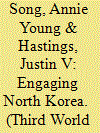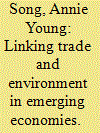| Srl | Item |
| 1 |
ID:
175051


|
|
|
|
|
| Summary/Abstract |
Despite ongoing political tensions and sanctions, North Korea and South Korea have made some progress in forestry cooperation. To explain the persistence of this cooperation, we draw upon a local approach to environmental peacebuilding. By tracing inter-Korean forestry cooperation from 2000 to 2018, this study finds that cooperation persists because of a North Korean desire for cooperation specifically on the environment, and because non-governmental organisations (NGOs) with close ties to the South Korean government provided an alternative way to implement inter-Korean forestry cooperation through periods of tension. Our findings also highlight the benefits of using environmental cooperation as a way to engage with North Korea in a depoliticised and sanction-free context. This finding has far-reaching implications for environmental peacebuilding. First, NGOs can pave the way for engaging conflict parties even in the face of ongoing hostility. Second, environmental cooperation provides an opportunity for a win–win strategy for conflict parties.
|
|
|
|
|
|
|
|
|
|
|
|
|
|
|
|
| 2 |
ID:
177691


|
|
|
|
|
| Summary/Abstract |
In trade negotiations, developed countries have been frontrunners in advocating environmental protection whereas developing countries were reluctant to link environmental protection to their trade agreements. However, the recent trend of including environmental provisions (EPs) in free trade agreements (FTAs) shows a policy change in some of the emerging economies. Not only did they adopt EPs but they also actively introduced a comprehensive set of EPs – environmental chapters. Using the Republic of Korea (Korea)’s FTAs, this study explores why emerging economies come to include environmental chapters in their FTAs. Existing studies have offered explanations focusing on domestic politics. Yet, they do not specify the impact of the interaction between domestic and international politics. Through the lens of the two-level games, this study finds that the combination of domestic and international pressures plays an important role in making green FTAs. First, Korea has been pursuing environmental leadership at the world stage during the Korea-US FTA (KORUS) negotiation. Against this background, the US’ proposal to include an environmental chapter has reverberated within domestic politics. Second, the costs of implementing this environmental chapter were low. After the KORUS, Korea has been including similar environmental chapters because these chapters were cost-effective ways to promote its enduring environmental leadership. This finding has far-reaching implications for facilitating emerging economies’ green FTAs.
|
|
|
|
|
|
|
|
|
|
|
|
|
|
|
|
| 3 |
ID:
186139


|
|
|
|
|
| Summary/Abstract |
This study explores the conditions under which China complies with the international norms of banning the trade in endangered species using tiger bones and ivory cases. Why did China ban the ivory trade but attempt to allow the trade in tiger derivatives? The authors traced the key policies formulated by Chinese policymakers during 1981–2018. Drawing upon norm localization theory, the authors find that domestic policy preferences played a key role in linking domestic and international norms. Chinese policymakers actively chose ideas to advance their policy preferences, and this localization process reaches beyond a static fitting process between domestic-international norms. This finding has implications for wildlife policies in developing countries and sheds light on China’s wildlife policy development following the outbreak of coronavirus.
|
|
|
|
|
|
|
|
|
|
|
|
|
|
|
|